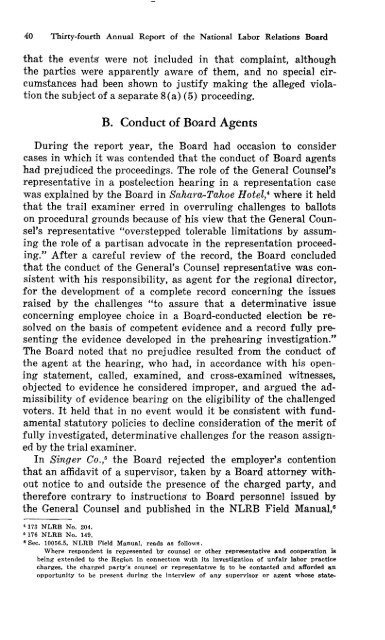1 - National Labor Relations Board
1 - National Labor Relations Board
1 - National Labor Relations Board
Create successful ePaper yourself
Turn your PDF publications into a flip-book with our unique Google optimized e-Paper software.
40 Thirty-fourth Annual Report of the <strong>National</strong> <strong>Labor</strong> <strong>Relations</strong> <strong>Board</strong><br />
that the events were not included in that complaint, although<br />
the parties were apparently aware of them, and no special circumstances<br />
had been shown to justify making the alleged violation<br />
the subject of a separate 8(a) (5) proceeding.<br />
B. Conduct of <strong>Board</strong> Agents<br />
During the report year, the <strong>Board</strong> had occasion to consider<br />
cases in which it was contended that the conduct of <strong>Board</strong> agents<br />
had prejudiced the proceedings. The role of the General Counsel's<br />
representative in a postelection hearing in a representation case<br />
was explained by the <strong>Board</strong> in Sahara-Tahoe Hotel,4 where it held<br />
that the trail examiner erred in overruling challenges to ballots<br />
on procedural grounds because of his view that the General Counsel's<br />
representative "overstepped tolerable limitations by assuming<br />
the role of a partisan advocate in the representation proceeding."<br />
After a careful review of the record, the <strong>Board</strong> concluded<br />
that the conduct of the General's Counsel representative was consistent<br />
with his responsibility, as agent for the regional director,<br />
for the development of a complete record concerning the issues<br />
raised by the challenges "to assure that a determinative issue<br />
concerning employee choice in a <strong>Board</strong>-conducted election be resolved<br />
on the basis of competent evidence and a record fully presenting<br />
the evidence developed in the prehearing investigation."<br />
The <strong>Board</strong> noted that no prejudice resulted from the conduct of<br />
the agent at the hearing, who had, in accordance with his opening<br />
statement, called, examined, and cross-examined witnesses,<br />
objected to evidence he considered improper, and argued the admissibility<br />
of evidence bearing on the eligibility of the challenged<br />
voters. It held that in no event would it be consistent with fundamental<br />
statutory policies to decline consideration of the merit of<br />
fully investigated, determinative challenges for the reason assigned<br />
by the trial examiner.<br />
In Singer Co., 5 the <strong>Board</strong> rejected the employer's contention<br />
that an affidavit of a supervisor, taken by a <strong>Board</strong> attorney without<br />
notice to and outside the presence of the charged party, and<br />
therefore contrary to instructions to <strong>Board</strong> personnel issued by<br />
the General Counsel and published in the NLRB Field Manual,6<br />
4 173 NLRB No. 209.<br />
5 176 NLRB No. 149.<br />
'Sec. 10056.5, NLRB Field Manual, reads as follows.<br />
Where respondent is represented by counsel or other representative and cooperation is<br />
being extended to the Region in connect/on with its investigation of unfair labor practice<br />
charges, the charged party's counsel or representative is to be contacted and afforded an<br />
opportunity to be present during the interview of any supervisor or agent whose state-

















